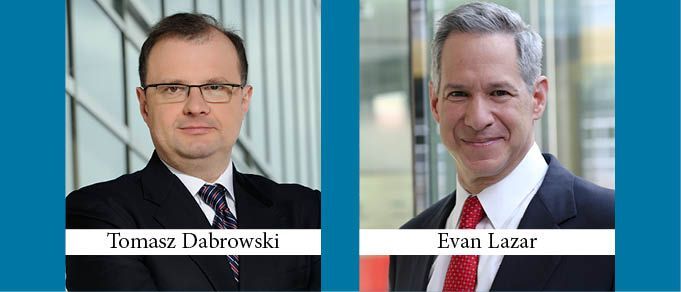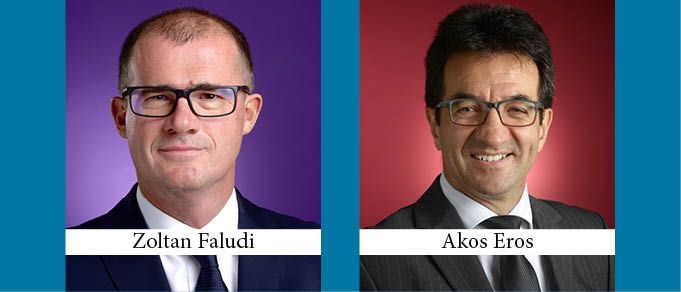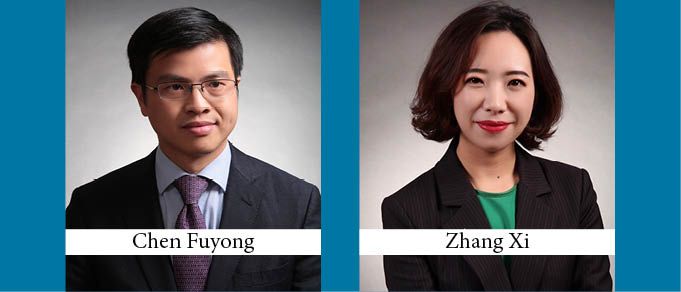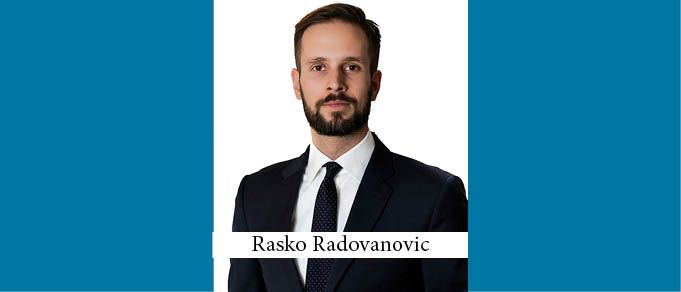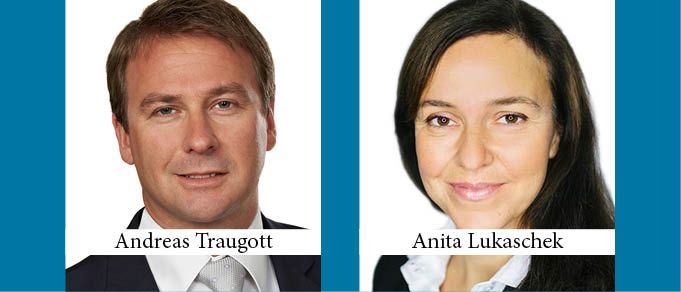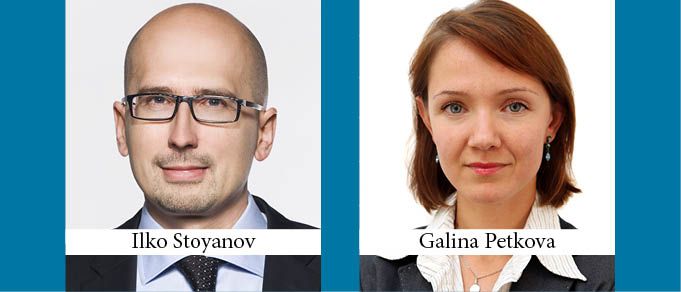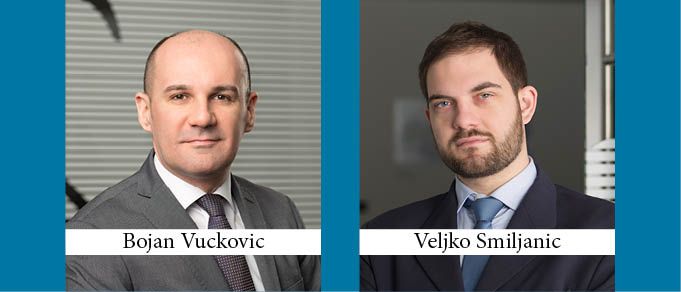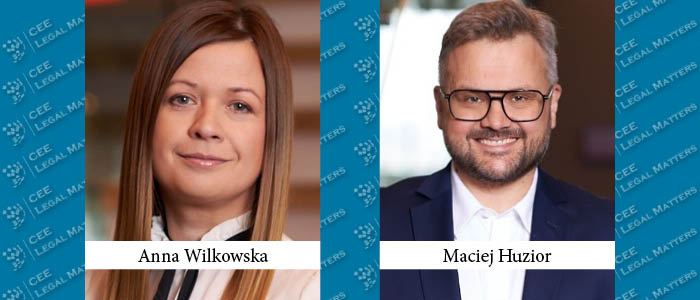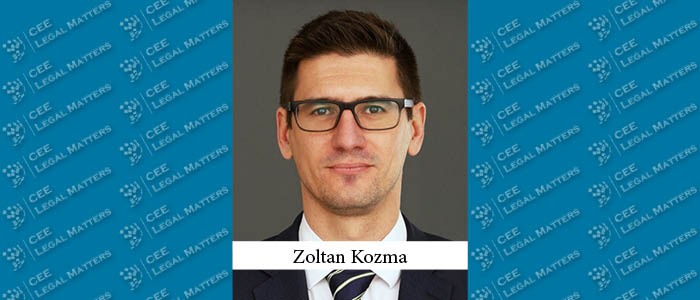While happiness is increasingly considered the proper measure of social progress, Ukraine occupies only 138th position among 156 nations included in the multi-index World Happiness Report 2018. The country has fought for its happiness since becoming independent in 1991 following the collapse of the Soviet Union. As part of this patient and hopeful nation, I continue to believe that happiness is coming soon, exactly as I did in that already-distant 1991, when there was almost no private business and almost no legal market in Ukraine.
Fine at Five: Dentons Continues to Move Forward
In 2013 the SNR Denton, Fraser Milner Casgrain, and Salans law firms merged into one entity: Dentons. The firm capitalized on its momentum by merging two years later with China’s Dacheng law firm, making it the largest law firm in the world. On the occasion of the firm’s 5th anniversary, CEE Legal Matters reached out to Dentons Partner and Europe Chief Executive Officer Tomasz Dabrowski in Poland and Dentons Partner and Global Vice Chair Evan Lazar in Prague to ask about the first five years and to see what’s next in Denton’s strategy for Europe and CEE.
Bajtars: Comrades and Colleagues at Wolf Theiss Hungary
On September 11, 2018, CEE Legal Matters reported that Akos Eros, the Managing Partner of Squire Patton Boggs in Hungary, had taken a team from that international firm to join Wolf Theiss, led in Budapest by his old friend Zoltan Faludi. The reunion of these two actual comrades-in-arms is a source of real excitement at Wolf Theiss Hungary, which is embracing the changing legal market of the moment with confidence and style.
Guest Editorial: Will A.I. Ultimately Be Our Undoing?
Less than 30 years after the wholescale introduction of computers into the legal profession, we find ourselves on the brink of a 4th industrial revolution. Today, we have cars that can drive on their own, we can print almost anything (including entire buildings and human body parts) on a 3D printer, and the Internet of Things is becoming a natural part of our everyday lives. All these tools are making our lives easier and more comfortable. And as the business world adapts to this new era, the legal profession obviously cannot stay behind.
The Changing Landscape of International Arbitration in China
Ever since the Arbitration Law of the People’s Republic of China (the “Chinese Arbitration Law”) was enacted in 1994, the landscape of Chinese commercial arbitration has gone through a profound change. At the end of 2017, there were 251 arbitration institutions in China. With experience gained over the past two decades, some institutions, such as the Beijing Arbitration Commission/ Beijing International Arbitration Center (the “BAC/BIAC”), have won a reputation for high quality within the international arbitration community and have become popular for cross-border dispute resolution among both Chinese and foreign parties. Parties who intend to settle cross-border disputes by arbitration in China are well-advised to learn more about this important option.
Recognition of Matrimonial Community Debt in the Practice of Equity Investment Under China’s Marriage Law
Most agreements between investors and the founders of companies or projects contain valuation-adjustment mechanisms or repurchase arrangements to protect investors from the potential failure of the investments or failure of the founders to fulfill their commitments. However, investors may nonetheless fail to get their money back if the founders have few assets, or none. One way to solve this is to go after the founders’ spouses by claiming that the commitments or debts of the founders constitutes matrimonial community debt, requiring reimbursement from the spouses. Matrimonial community debt is set out in the Marriage Law of the People’s Republic of China (“Marriage Law”), and in recent years China\s Supreme People’s Court (SPC) has changed its position on how to recognize matrimonial community debt.
Considerations in International Technology Licenses for Chinese Lawyers
With the ongoing commitment to reform and opening to the outside world and the steady implementation of the Belt and Road initiative, the percentage of China’s entire trade regime accounted for by international technology is growing larger and larger. International technology licenses are among the major forms of technology trade between countries. Due to the differences in legal systems, legal regimes, and legal cultures of the various trade participants, lawyers are highly encouraged to pay particular attention to the following issues when drafting and reviewing international technology agreements.
An Overview of Automated Driving in China
The future is coming. Soon, people will order a car to send kids to school without the need for a driver. When you get out of a car at the main entrance of a busy shopping mall, it will park itself. Although those scenarios sound too good to be true, the automotive industry is predicting that automated driving will arrive within the next five to ten years.
Shedding Light on China’s Negative List for Foreign Investment Access (2018 Edition)
China, with its huge market, comprehensive industry chain, and rapidly rising scientific and technological strength, is increasingly favored by international investors. According to the Foreign Investment Department of China’s Ministry of Commerce, from January to December 2017, there were 25,652 newly approved foreign-invested enterprises – an increase of 27.8% from the year before – and the actual total of foreign investment reached RMB 877.56 billion (approximately USD 131.04 billion), up 7.9% from 2016.
Towards a More Dynamic Reorganization Market: Reflections on China’s Recent Development on Corporate Reorganization
In 2017, the reorganization of Chongqing Iron and Steel Company sensationalized the steel industry as well as the reorganization market in China. This steel titan, listed on both the mainland and Hong Kong stock exchanges, managed to emerge from bankruptcy only six months after the court accepted its reorganization application. During this period, the sophisticated reorganization plan, which provided more than CNY 10 billion cash in debt payment to the company’s creditors, was formulated, accepted, approved, and fully implemented. Such reorganization is a microcosm of the thriving reorganization market in China. Since reorganization was introduced by the current Enterprise Bankruptcy Law in 2006, the emerging reorganization market has grown rapidly, especially after 2015 when the central government formulated the policy to deleverage, reduce inventory, and address overcapacity. Professionals and investors are pouring into this promising, developing, and challenging market. And China’s market for non-performing assets disposal is undergoing a transition from enforcement-focused to reorganization-oriented.
Territorial Scope of the Montenegrin Competition Law
Article 2 of the Montenegrin Law on the Protection of Competition limits the law’s application to acts undertaken within the territory of Montenegro and acts undertaken outside of Montenegro which have as their object or effect the distortion of competition in Montenegro. In practice, however, the Law on the Protection of Competition (the “Law”) seems sometimes to be applied beyond its territorial scope.
New Guidance on Transaction Value Threshold
On July 9, 2018, the German and Austrian competition authorities published joint guidelines regarding the transaction value thresholds of their respective merger regimes.
First Decisions Prohibiting Concentrations Issued in Bulgaria
Two concentrations recently prohibited by the Bulgarian Commission for the Protection of Competition with limited analysis have been widely criticized for their lack of valid economic arguments. Because both decisions were highly publicized and concern the politically sensitive sectors of media and energy, they are worth special attention.
The Position of Intervener in Procedure Before the Slovenian Competition Protection Agency
The well-formed regulation of competition is a precondition for a healthy and effective market. Thus, countries have to not only adopt appropriate legislation, but also ensure that the relevant authorities will enforce that legislation in a way that allows all participants in the market to carry out their activities in a fair environment.
Unfair Trading Practices in the Food Supply Chain – New Competence of the Croatian Competition Agency
At the EU level, long-term discussions on unfair trading practices in the food supply chain have resulted in the Proposal for a Directive that is currently in process. The Republic of Croatia has already adopted a law with a similar subject matter – the Act on Tackling Unfair Trading Practices in the Food Supply Chain (the “Act”) – which entered into force at the end of 2017. The Act concerns business-to-business relations and aims to protect suppliers (including primary producers) in their relations with resellers, buyers, and processors with significant negotiating power. The authority in charge of implementing the Act is the Croatian Competition Agency (the “Agency”), which the legislator considers the most competent to handle these matters due to its experience in abuse of dominance cases in competition law.
Antitrust Enforcement in Poland: What 2018 Brought and What Lies Ahead
The Polish Competition Authority has been increasingly active as the market watchdog. In assuming his position as President of the Competition Authority in 2016, Marek Niechcial announced his commitment to strengthening competition law enforcement via a stricter approach, more investigations, and higher fines for wrongdoers. The last two years demonstrate that the Authority is working towards delivering on this promise.
Designing a Competition Enforcement System: The Imperative of Credibility
It is not uncommon for post-communist societies to wrestle with the idea of competition enforcement. Executives of a more old-school bent are often confounded by having something which once was common market practice, sometimes even mandated by the state, now scrutinized and considered a serious infringement of law. This is why competition advocacy is a crucial tool for relatively inexperienced competition authorities – it would hardly be fair to beat upon market players legitimately unaware of changes to the modus operandi.
The Dusk of (Illegal) Dawn Raids in Slovakia?
The competence of the Slovak Antimonopoly Office to conduct dawn raids is governed by Article 22a of Slovakia’s Act No 136/2001 Coll. on Protection of Competition.


